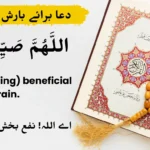Sayyidul Istighfar is one of the most powerful duas for seeking Allah’s forgiveness. It is a comprehensive supplication that reflects a believer’s humility, gratitude, and reliance on Allah. In this article, we will explore Sayyidul Istighfar, its significance, and its translation in Arabic, Urdu, and English.
| Powerful Dua for Forgiveness- Seek Allah’s Mercy |
| Surah Ghafir (40:44) Wa Ufawwidu Amri ilallah |
| Dua e Eid- Taqaballahu Wa Minkum |
| Ahlan Wa Sahlan Marhaba- أَهْلًا وَسَهْلًا وَمَرْحَبًا |
What is Sayyidul Istighfar?
Sayyidul Istighfar is a special dua recommended by Prophet Muhammad (PBUH) for those who seek Allah’s mercy and forgiveness. It is often referred to as the “Master of Istighfar” due to its profound meanings and blessings.
Full Arabic Text:
اللَّهُمَّ أَنْتَ رَبِّي لَا إِلَهَ إِلَّا أَنْتَ خَلَقْتَنِي وَأَنَا عَبْدُكَ وَأَنَا عَلَىٰ عَهْدِكَ وَوَعْدِكَ مَا اسْتَطَعْتُ أَعُوذُ بِكَ مِنْ شَرِّ مَا صَنَعْتُ أَبُوءُ لَكَ بِنِعْمَتِكَ عَلَيَّ وَأَبُوءُ بِذَنْبِي فَاغْفِرْ لِي فَإِنَّهُ لَا يَغْفِرُ الذُّنُوبَ إِلَّا أَنْتَ
English:
“O Allah, You are my Lord. There is no deity except You. You created me, and I am Your servant. I adhere to Your covenant and promise as much as I can. I seek refuge in You from the evil of what I have done. I acknowledge Your favor upon me and I acknowledge my sin. So forgive me, for none forgives sins except You.”
Urdu:
اللہمُ انتَ ربِّيّ، لا الہ اِلا انتَ، تو نے مجھے پیدا کیا اور میں تیرا بندہ ہوں، میں تیرے احکامات اور وعدے پے قائم رہتا ہوں، جیسا میں قابل ہوں، تو میرے اعمال کی برائیوں سے مجھے محفوظ رکھ، میں تیری نعمتوں اور اپنے گناہوں کے اقرار کرتا ہوں، تو میرے گناہ معاف کردیِجیّ۔ بیشک گناہ معاف کرنے والا صرف تو ہے۔
Significance of dua for forgiveness
1. Recognizing Allah’s Sovereignty
The dua begins with the acknowledgment of Allah as the sole creator and sustainer. It establishes a deep sense of servitude and submission to His will.
2. Admitting One’s Faults
The supplication beautifully combines gratitude for Allah’s blessings with the admission of sins, portraying the believer’s humility.
3. Assurance of Forgiveness
dua for forgiveness ends with the hope and belief in Allah’s unmatched ability to forgive sins, which instills peace and optimism in the reciter’s heart.
When and How to Recite dua for forgiveness
- Morning and Evening: The Prophet (PBUH) encouraged reciting this dua during morning and evening supplications.
- After Salah: Sayyidul Istighfar can be included in post-prayer dhikr for seeking forgiveness.
- During Hard Times: In moments of distress or guilt, this supplication serves as a spiritual refuge.
Related Quranic Verses
- Surah Az-Zumar (39:53): “Say, ‘O My servants who have transgressed against themselves, do not despair of the mercy of Allah. Indeed, Allah forgives all sins. Indeed, it is He who is the Forgiving, the Merciful.’”
- Surah Al-Baqarah (2:286): “Our Lord, do not impose blame upon us if we forget or make a mistake. Our Lord, and lay not upon us a burden like that which You laid upon those before us.”
Conclusion
dua for forgiveness is a profound supplication that encapsulates gratitude, repentance, and hope. It’s a reminder of Allah’s infinite mercy and a call for believers to turn to Him sincerely. By incorporating this dua into our daily lives, we can seek forgiveness and draw closer to Allah.
FAQs
It is called the Master of Istighfar due to its comprehensive nature in seeking forgiveness, acknowledging Allah’s blessings, and expressing gratitude.
The best times include early morning, evening, and after obligatory prayers.
Reciting it brings forgiveness, peace of mind, protection from hardships, and strengthens one’s connection with Allah.




